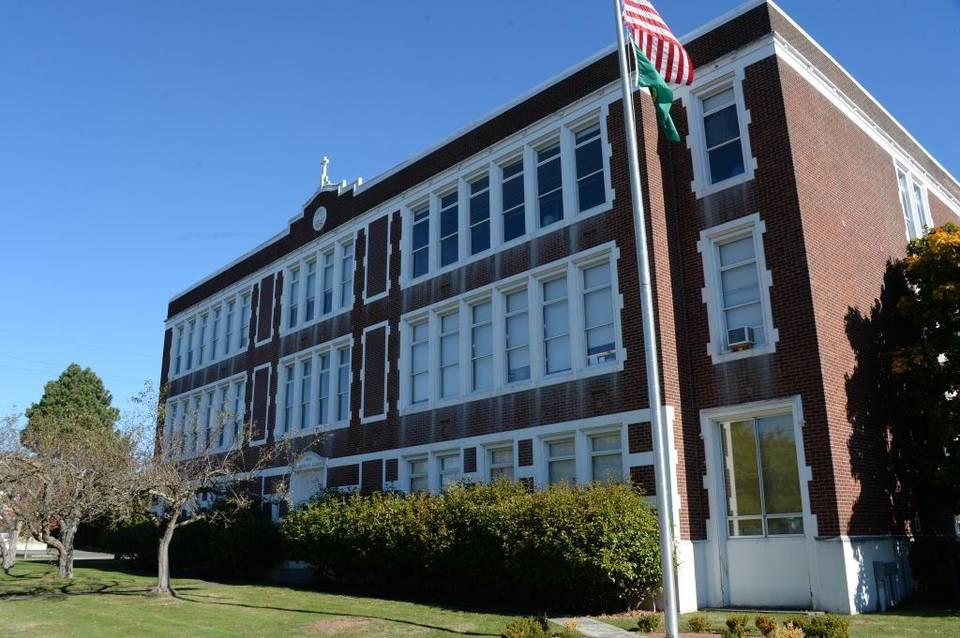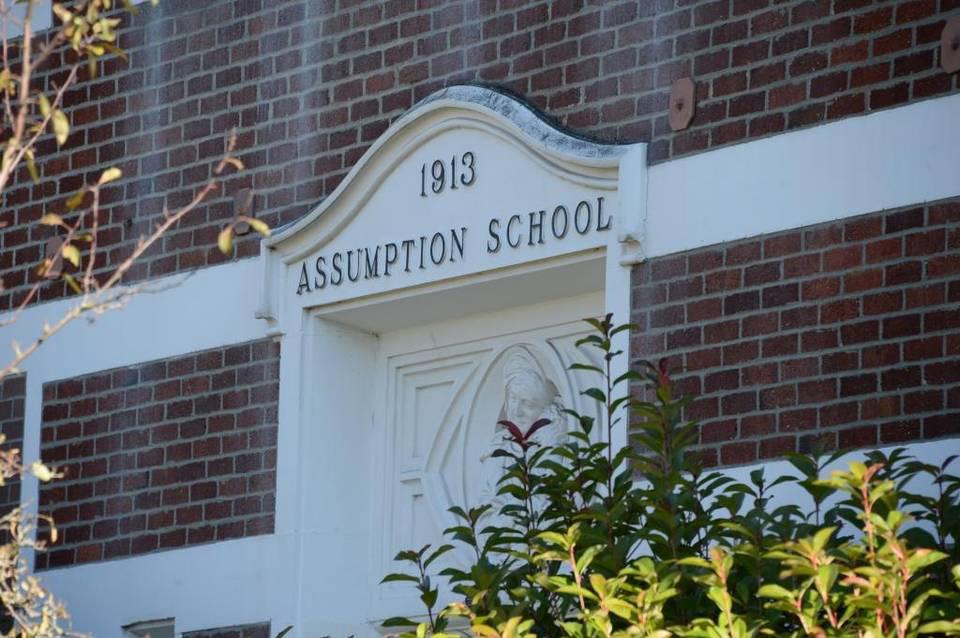|
Bellingham parents withdraw kids from Catholic school over sex offender controversy
By Caleb Hutton
Bellingham Herald
October 16, 2016
http://www.bellinghamherald.com/news/local/article108369317.html
 |
Assumption Elementary School, Bellingham, Oct. 11, 2016.
Photo by Philip A. Dwyer |
 |
Assumption Elementary School, Bellingham, Oct. 11, 2016.
Photo by Philip A. Dwyer |
BELLINGHAM
If a sex offender makes regular visits to an elementary school, who needs to know?
Some parents at Assumption Catholic School, a preschool and K-8 school in Bellingham, believe staff erred by waiting a year to warn all families of a parent who was a registered level II sex offender. At least three families were so concerned by the way the situation was handled that they withdrew their children from the school.
In August 2015, a man, 53, and his wife enrolled their daughter in preschool at Assumption. The man, who routinely dropped off his child at 2116 Cornwall Ave., had been on probation for sex offenses until late 2011. The school did not learn of his record until three months into the year.
In response, staff wrote a set of policies with guidance from the Seattle Archdiocese: At all times on campus the man would remain under supervision; he would not go on field trips with students; and he would not get out of the car when picking up or dropping off his child, unless staff accompanied him. Preschool parents were notified. Parents of children in kindergarten to eighth grade were not.
This was not a secret or a cover-up, said Dan Anderson, the school’s principal. Staff didn’t know if the girl would be continuing on to kindergarten, which is part of a separate school on the same campus.
“It was never that we weren’t going to communicate this information to parents,” Anderson said. “We gave it to them when we felt it was necessary.”
In July 2016, an elementary school mother was setting up a buddy system that would connect families new to the grade school with established families. Parents paired with the man’s family replied they weren’t comfortable, but they did not explain why. So the coordinator searched the man’s name on Google.
“To say I was shocked and horrified would be a gross understatement,” she wrote in a letter to the Seattle Archdiocese obtained by The Bellingham Herald. She listed off concerns: that a sex offender had been allowed on campus; that not all families knew his situation; and as a result she could have inadvertently put other students at risk. She never received a response, or even acknowledgment that it was received. She withdrew her kids from the school over the situation.
Other parents like Ann Daley, who also withdrew her kids, discovered court records recounting the man’s criminal record, with admitted abuse of four girls, and two other alleged victims, dating from 1982 to 2008.
“It spelled out every reason why this person has no right to be anywhere near children,” Daley said.
Background
In the 1980s the man was charged with indecent liberties with a minor, a misdemeanor in South Dakota, for sexually touching two girls aged 7 to 11, who were in his care. A deviancy evaluation notes that, at the time, he may not have disclosed the extent of the abuse to his therapist. “It appears that he was undercharged,” one psychosexual report notes. His sentence was largely related to alcohol treatment.
Years later, in 2002, he was convicted of molesting two other girls who lived in Bellingham. He estimated having sexual contact with those victims about 200 times, in incidents from the early 1990s to early 2000s, according to court records. A Whatcom County judge, David Nichols, sentenced the man to an alternative sex offender sentence, that is, six months in jail, with 8 ½ years of prison suspended.
On probation the offender was restricted from visiting places where children congregate. In a self-evaluation he wrote that he wanted to avoid those places – and public beaches, and pools, and so on – as a strategy to keep from offending again.
In 2008, he was charged with molesting two more girls under the age of 12.
“It is fair to say that (he) started supervision strong,” reads a Department of Corrections report dated Aug. 22, 2008. “However, in hindsight, he slowly began to demonstrate a serious lack of discipline and caution, which ultimately contributed to his failure to satisfactorily meet the standards of the Special Sex Offender Sentencing Alternative.”
Both of the 2008 cases eventually were dropped due to insufficient evidence, and the man was relieved of supervision in November 2011. A certificate notes the dismissal is “not based on a finding of rehabilitation.”
To his credit, a case file of more than 200 pages describes how he worked for years to overcome his demons, with the help of group therapy. His therapist wrote that he had shown remorse for his actions, and once wept at a group meeting as he recalled how he hurt those close to him. He beat addictions to alcohol and cocaine that seemed, in the doctor’s view, to be linked to his cycle of abuse, and he embraced sex offender treatment.
He remains registered as a level II sex offender, meaning he is considered at moderate risk to reoffend. Over the past few years he married, and his wife had a child. He did not return a reporter’s phone messages.
Hindsight
A week after the mother’s letter to the archdiocese, the school’s new principal, Anderson, sent an email to families of the school’s roughly 175 students, welcoming them to a new year.
The last four paragraphs of the five-paragraph letter informed parents of the offender’s presence, and how the situation would be handled: how he would be supervised on campus; how the school should be a loving, caring, welcoming place for the daughter; and how his wife had been approved as a member of the school commission.
Anderson gave parents an abbreviated biography. The father “was arrested in 2000, convicted in 2002, and after ten years of intensive treatment, he is in the 1st percentile of offenders who have demonstrated authentic rehabilitation,” he wrote. (That’s not a percentile based on a scientific measure, Anderson clarified to a reporter. It’s the principal’s estimation of how successful the offender had been at rehabilitating).
Parents went to Father Scott Connelly, the school’s highest authority, asking why they weren’t told earlier.
“I want to assure you that all last year the safety of your children was top on our list,” Connelly wrote to school families in late August. “In hindsight, it would have been better for us to have informed the rest of the school community. I apologize that we did not do so.”
The next day the man’s family withdrew from the school. Anderson declined to say whether the school asked them to leave, or if they left on their own.
Bill Attebery, the interim principal last year, said he would not change the way the school handled the situation, given how everything unfolded. He was disappointed, he said, that the father did not come clean about his record when enrolling the child.
By then it was the end of November. It didn’t make sense, Attebery said, to say the girl couldn’t stay at the school. But when it came to notifying parents, the preschool was so separate from the older kids that he didn’t feel it was necessary to alert parents of older kids.
The preschool and grade school share a campus, and a car loop for dropping off kids. Over the following months the father was personally supervised by Attebery as they walked the girl to and from her classroom. The father’s time on campus at the school was “very, very brief,” he said.
Concerning the church
State law does not require schools to inform parents of another parent who is a sex offender, and while some states, like Montana, ban offenders from “predatory loitering” on campuses, Washington is not one of them. If an offender remains under supervision by Corrections, the state has wide latitude to keep him or her away from schools, parks, and even the internet.
Public schools in this area, for example those in the Bellingham School District, will not inform parents of a sex offender’s presence unless police make a specific request to do so. Local schools require background checks if parents want to volunteer in the classroom.
No school administrators in Bellingham, Ferndale, or Blaine could recall a situation where a student’s parent was a registered offender. But it seems highly unlikely to Attebery that it never has happened here.
“I think it’s interesting that this whole matter has come about because we were open,” Attebery said. “Because we did share it, we are being brought under scrutiny.”
The scenario has come up across the country, as public schools grapple with how to address offenders who have served their time, kept a clean record for years, and worked to have a normal life with a family, and kids.
At a private Catholic school it’s perhaps an even thornier situation, when cover-ups within the clergy – abuses of trust that led to the sexual abuse of thousands of children – remain fresh in the minds of the public and parishioners.
Sexual predators in the priesthood were kept secret and shuffled to new parishes, in efforts to protect the church. This happened at Assumption, in the case of Father Michael Cody. The Seattle Archdiocese knew Cody had molested at least eight girls by 1962, according to internal records made public in a recent lawsuit. Yet Cody continued to serve as a priest in La Conner, Burlington, and Bellingham into the 1970s.
Just months ago the Seattle Archdiocese acknowledged Cody’s abuse by releasing names of 77 priests who preyed on children. The church has paid a heavy price for its past mistakes, said Greg Magnoni, a spokesman for the Seattle Archdiocese.
“Obviously we’re very sensitive, because we’ve made mistakes in the past,” he said, “and we’ve learned from those mistakes.”
Magnoni does not believe the school erred here, nor that it indicates a problem specific to Catholics.
At least a few parents and activists would disagree. Withholding this kind of information could be considered another kind of abuse: of a parent’s trust and ability to make informed choices about kids’ safety, said Mary Dispenza, a former nun and a Seattle-based volunteer director for the Survivors Network of those Abused by Priests.
“You feel betrayed,” she said. “I think that’s what causes some of us to leave the Catholic Church. We feel betrayed. It’s too big of a betrayal, because our children are put at risk.”
The school, she said, should have just told all parents in the first place.
“Most of us are intelligent, sensitive, and compassionate,” Dispenza said. “We’re not going to misuse that information, but it’ll keep us on our guard.”
Protection
For parents who volunteer at Assumption and other Catholic schools, the church requires background checks and annual trainings called Protecting God’s Children, where parents are instructed how to keep students out of situations where they could be abused.
“The whole reason we have Safe Environment training is to keep people on guard all the time,” Anderson said. “Abuse could be committed by any person, not just a registered sex offender. It could be anyone.”
The training program is a step in the right direction, said Carol Frazey, an Assumption parent whose children attended from preschool to eighth grade. Her youngest boy graduated last year, and she is a longtime supporter of Catholic schooling.
However, in Frazey’s view, the school and church failed to live up to their own standards, when a real concern came up related to protecting children. Then the archdiocese offered little to no response when parents had concerns, she said, and no one was held accountable.
“There are no consequences for the priests, superintendents, or the archdiocese,” Frazey said. “They just say: We’re sorry, now let’s move on.”
Read more here: http://www.bellinghamherald.com/news/local/article108369317.html#storylink=cpy
Contact: chutton@bhamherald.com
|

